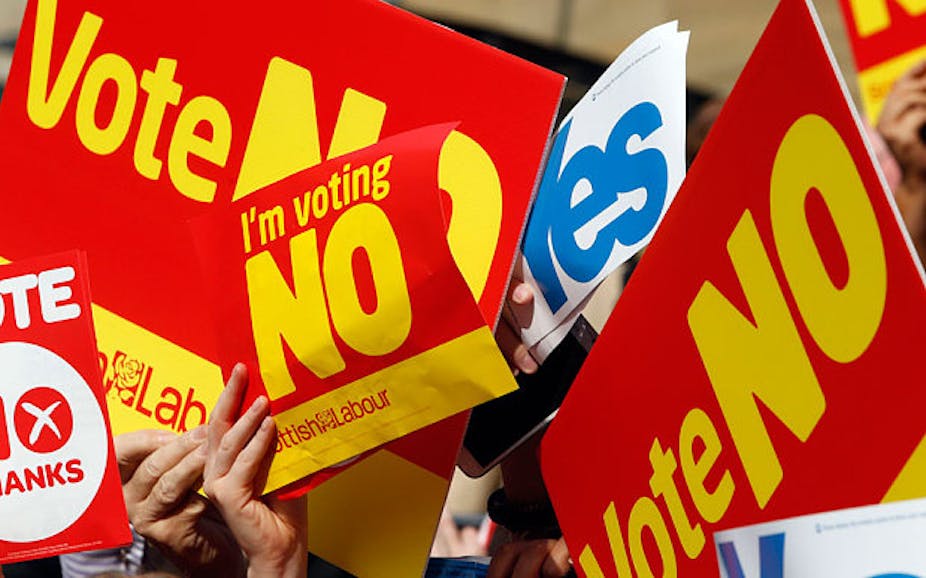Beneath all the lachrymose histrionics, the excuses and claims about the false consciousness of those oppressed by the English, the plain and indisputable fact is that Scots rejected the prospect of separating from the United Kingdom spectacularly: 55% said no, against 45% yes.

First Minister Alex Salmond can resign knowing that he failed under the conditions most favourable to him. He picked the question and he chose the electorate, enfranchising 16 and 17 year olds he thought would back independence while disenfranchising Scots like me just because we live south of the border he has spent his adult life trying to establish.

He picked the date, giving him plenty of time for the nationalist cause to gain momentum, and to coincide with Glasgow’s hosting of the Commonwealth Games and the anniversary of the Battle of Bannockburn. He had the money, the momentum and the troops on the ground. And he was up against a lamentably lacklustre, pathetically uninspiring Unionist campaign led – if that is not too generous a term to use – by someone who looked like a barely competent Edinburgh bank manager and backed by the closest thing Britain has had to an aristocratic Prime Minister for fifty years, during a time of ruthless cuts to the public sector spending that the Scottish economy relies so much on. Yet when a record 84.6% of the electorate went to cast their vote, the results left no doubts: the majority of the Scottish people voted to retain the Union; the majority of people north of the border has no desire for constitutional change, nor any appetite for yet another unaccountable technocratic convention, staffed by self-styled political cognoscenti.
This is all true, except in Glasgow. The most populous, dynamic, hard-working, exciting, creative and spirited city in Scotland voted for separation convincingly, 53% to 47%. More than the comprehensive rejection of Scottish nationalism yesterday – which is entirely consistent with Scottish political behaviour over the last fifty years – it is the anomaly of Glasgow that is the most interesting and telling thing about yesterday’s results and raises the most interesting questions for the future, especially that of the Labour party. Before they stopped using the first-past-the-post electoral system in 2007, the Labour party held 71 out of the 79 council seats in Glasgow.
They continue to hold all seven parliamentary seats. This city that falls occasionally victim to the most basic of tribal, sectarian divisions nevertheless traditionally puts aside any such differences when it comes to Labour: at elections, blue and green both become red. With the exception of the occasional by-election protest vote (such as the iconic Jim Sillars triumph in 1988), the city of Glasgow has historically been the least likely place for Scottish nationalism to make an electoral dent. And yet yesterday a majority of Glaswegians voted to end the United Kingdom.

Amidst the relief that the United Kingdom has survived, the Glasgow result should send the whole Labour party – its leaders, its councillors, its trade union members and its doorstep activists – into a kind of palsied frenzy. They might try to console themselves with the thought that those voters who backed independence yesterday will fall back in line at the next UK General Election. This response would most likely mean a further drift towards the SNP at Scottish Parliament elections, meaning that even if Labour were to acquire a majority at Westminster, any questions of constitutional reform would continue to be phrased in nationalist terms, rather than through re-empowering local government and communities.
At first glance, the referendum result might look like the worst possible for Labour in its post-industrial heartland, the end of a long relationship in which its support has been taken for granted. But the vote yesterday has actually created the conditions of possibility for the renewal of that relationship. Voting for separation, for the break-up of such a long-standing political union will not have been an easy decision for many in Glasgow. To face the uncertainties and economic dangers posed by independence and nevertheless decide that it is more attractive than the status quo will have been an uneasy conclusion for many, the product of much careful thought and reflection. The result indicates just how many people feel cast adrift and themselves disenfranchised by the current UK coalition government, which – like all coalition governments – is pushing through its agenda without a comprehensive national mandate. If it is to survive, let alone flourish, in the west of Scotland, the Labour party must bring these disillusioned voters back into the fold. At the same time, those Glaswegians who voted for independence would be wise to look at the rest of the electorate north of the border and realise how little they have in common with many of their fellow nationals who voted against separation in such large numbers. If they recall instead the solidarity they have with residents of the other major post-industrial powerhouses of the UK, then the Labour party has much to gain from yesterday’s result.

